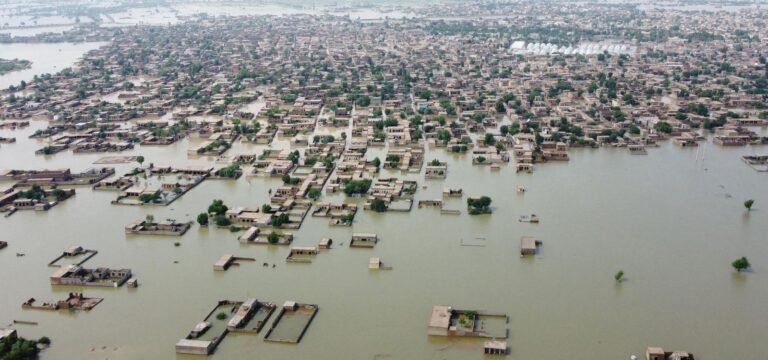Catastrophic floods in Pakistan have been attributed to climate change
The terrible floods of 2022 killed more than 1,700 people in Pakistan and caused almost $15 billion of damage. For many in the country, the devastating natural catastrophe underlined just how vulnerable Pakistan has become to climate change, particularly as glaciers in its mountainous regions melt. Now, Pakistani investors and entrepreneurs are teaming up to respond, with a new fund that will invest in local ventures offering scalable and impactful solutions.
The Sarmayacar Climaventures Fund is the brainchild of Lahore-based venture capital firm Sarmayacar. Today it will announce it has secured $15 million of anchor funding from the Green Climate Fund, a global initiative established by the United Nations to support developing countries working to reduce their greenhouse gas emissions and adapt to the impacts of climate change. In total, the fund is hoping to raise up to $40 million.
“Addressing Pakistan’s climate emergency requires an approach that fosters entrepreneurial innovation,” says Rabeel Warraich, CEO and founder of Sarmayacar. “Our fund will back founders who are building localised, scalable climate solutions for the country. We hope to spawn an entire climate venture ecosystem by leveraging our experience and connectivity in the country and beyond.”
The fund is the first domestic venture capital fund in Pakistan to offer a thematic approach to climate change. Warraich says he has already identified a universe of around 200 companies in the country that might be contenders for the portfolio, though he only envisages backing around 15 to 20 of these businesses.
Areas of focus for the fund will include energy generation and transition, e-mobility, water and waste treatment, recycling and agritech. Critically, argues Warraich, the fund’s investment in these areas will kickstart investment from other players, both domestic and international. “We recognise that $40 million is not going to be anywhere enough to address Pakistan’s climate change needs,” he says. “But we can be the catalyst that unlocks much greater sums for businesses with a role to play.”
Certainly, there is global appetite among investors for such opportunities. The Climate Policy Initiative’s Global Landscape of Climate Finance 2023 report suggests global climate finance doubled to $1.27 trillion last year.
However, this cash often does not find its way into developing markets, even though they may be particularly exposed. Pakistan ranks as the eighth most vulnerable country in the world to climate change, according to the Global Climate Risk Index.
Sarmayacar has a track record of innovation in Pakistani venture capital. It launched the country’s first venture capital fund in 2018, a $25 million vehicle anchored by the International Finance Corporation. Warraich says that fund catalysed more than $800 million of investment into Pakistani start-ups and scale-ups in sectors including fintech, e-commerce, healthtech and logistics. Such figures underline the potential for relatively small investors to kickstart broader investment, he argues.
The Sarmayacar Climaventures Fund will target a range of investors as it seeks to build on its initial funding from the Green Climate Fund. Targets include development finance institutions, international climate change-focused private equity and venture capital funds, and family offices and endowments with a mandate to pursue more impactful investments.
Warraich believes the fund can also have a positive impact on economic participation in Pakistan. “We are committed to fostering inclusivity within our investments by supporting women-led ventures and initiatives that promote diversity in entrepreneurship,” he adds. “We envision creating a community ecosystem of entrepreneurs, industry leaders and experts, and investors through networking events and collaborative projects, as well as mentorship and operational support.”

